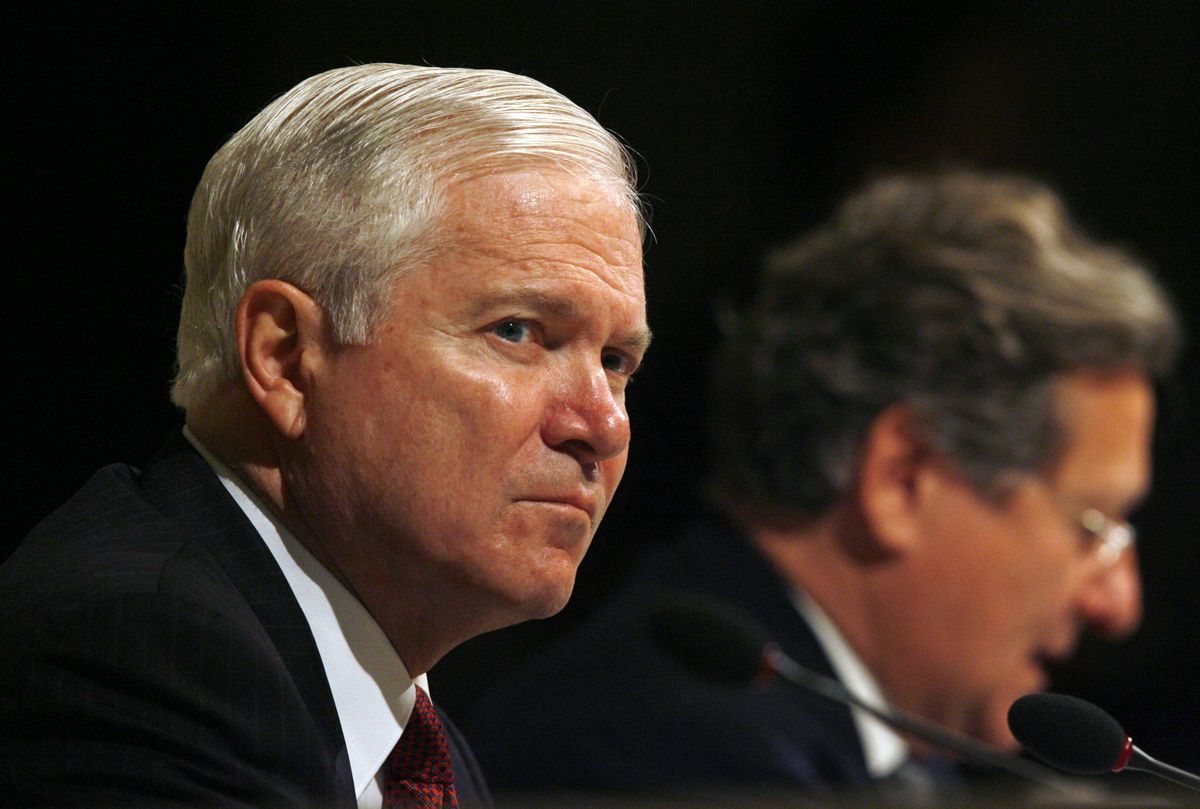Gates issues warning to North Korea
U.S. will hold rogue nation ‘fully accountable’ for spread of nuclear technology

SINGAPORE – Drawing the most explicit U.S. line yet on North Korea, Defense Secretary Robert M. Gates vowed today that the Obama administration would hold North Korea “fully accountable” if it sold or transferred any nuclear material outside its borders.
Gates sketched the framework of a new administration policy by saying that though a nuclear-armed North Korea is unacceptable, any step it takes to spread the technology would invite the swiftest and most forceful U.S. response.
“The transfer of nuclear weapons or material by North Korea to states or nonstate entities would be considered a grave threat to the United States and our allies,” Gates told officials gathered at an Asian defense summit here. “And we would hold North Korea fully accountable for the consequences of such action.”
Until Gates’ speech, the Obama administration’s policy on the North Korean nuclear threat was unclear. However, the warning by Gates formed the basis for President Barack Obama’s approach, classifying North Korea’s ambitions as a security concern for the region but, more seriously, as a proliferation worry for the United States and the rest of the world.
In the five days since North Korea detonated a nuclear bomb and then launched a series of missile tests, including one Friday, U.S. officials and their allies have reacted by denouncing the regime in general terms.
But Gates, in his address in Singapore this morning, was more specific, spelling out what action U.S. officials would find most objectionable and subject to a U.S. response.
He did not specify the potential consequences, but his language hinted at a military reaction by echoing post-Sept. 11 Bush administration warnings that those who harbor terrorists would be “held accountable.” Those warnings were followed by a U.S.-led invasion that toppled the Taliban government in Afghanistan.
Gates’ speech also may serve as a message to countries and militant groups that are potential buyers of North Korean weaponry. Past customers are believed to include Iran, Syria, Libya, the militant Lebanese group Hezbollah and others.
However, Gates’ appearance at the annual security conference also had powerful diplomatic overtones. Following his address, Gates was planning to meet with South Korean and Japanese counterparts to discuss security concerns, and he may meet with Chinese officials.
Those meetings are designed to reinforce U.S. security commitments to its allies and to encourage an expanded Chinese effort to rein in its belligerent neighbor. Gates is being joined in the meetings by Deputy Secretary of State Jacques Steinberg, a top aide to Secretary of State Hillary Rodham Clinton and a close White House ally.
Gates in his address said Obama was open to dialogue with North Korea and had pledged to work with “tyrannies that unclench their fists.” But Gates said North Korea’s response to U.S. overtures was disappointing.
“The United States and our allies are open to dialogue, but we will not bend to pressure or provocation,” he said. “And on this count, North Korea’s latest reply to our overtures isn’t exactly something we would characterize as helpful or constructive.”
At the United Nations, officials continued to negotiate a draft resolution calling for the enforcement of widely ignored sanctions imposed following North Korea’s 2006 nuclear test. The sanctions include further limits on shipments of arms and luxury goods.
Meanwhile, international nonproliferation officials said atmospheric tests may be completed next week to determine whether Monday’s blast was a nuclear test, as suspected.
Proliferation of nuclear material by North Korea is hardly a new concern. In recent days, administration officials, including Gates, have voiced concerns about the possibility that North Korea could seek to sell its nuclear technology. They have noted that North Korea has a track record of spreading its missile and other weapons technology around the world.
The annual security conference in Singapore, organized by the London-based International Institute for Strategic Studies, has become a key platform for U.S. defense secretaries to outline their approach to Asia.
Gates portrayed the United States as vigorously engaged throughout the region but with an emphasis both on military security and diplomatic outreach.
“What we have seen in the U.S. approach to Asia in recent years – and what I believe we will see in the future – is a very real shift that reflects new thinking in the U.S. defense strategy overall,” Gates said. He added: “A shift toward a re-balanced mix of the so-called ‘hard’ and ‘soft’ elements of national power.”
In recent years, security conference addresses by U.S. defense secretaries have been aimed squarely at China. In Gates’ address, the need for greater Chinese military transparency and dialogue, often the focus of past speeches, received only a cursory mention.
The Bush administration often was criticized for eschewing multilateral approaches to security problems. Gates made clear the new administration has no such reservation.
Challenges like terrorism, economic turmoil, pandemics and piracy require efforts by groups of nations, he said.
“What these challenges all have in common is that they simply cannot be overcome by one, or even two, countries,” he said, “no matter how wealthy or powerful.”